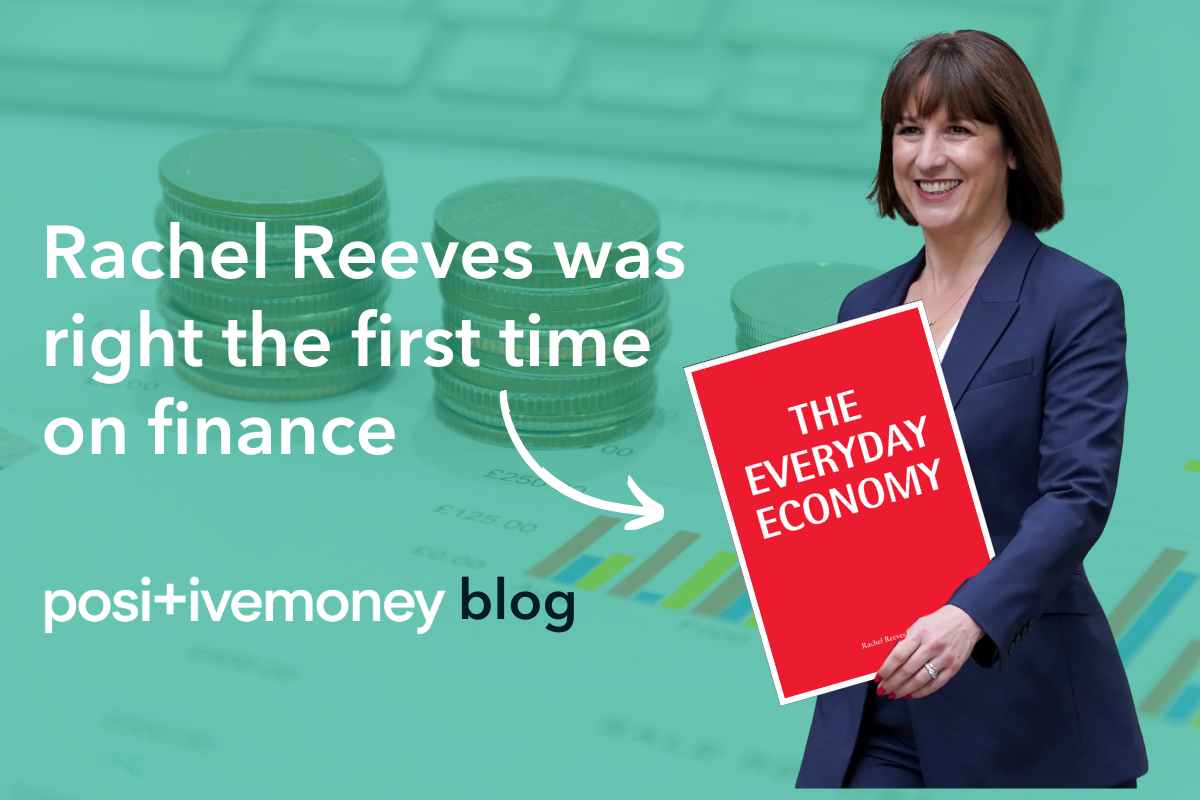
Finance and DemocracyUK
7 August 2025
The new Chancellor has been keen to praise the City of London as the 'crown jewel of our economy', but we prefer her earlier work
Many of us working towards a financial system which supports a fairer, more democratic and sustainable economy were left concerned by Rachel Reeves’ assertion that regulation has ‘gone too far’ since the 2008 crash in her Mansion House speech to the City of London last week.
What was striking was not just how out of tune the Chancellor seemed to be with the Bank of England governor’s recent warnings on the risks of complacency when memories of past crises fade, but also her own previous writing.
Though higher taxes on the huge windfalls banks have made during the cost of living crisis were absent from her recent Budget, the Chancellor wasn’t always against taxing the financial sector more fairly. In 2018, Reeves wrote an op-ed arguing for a financial transactions tax (often referred to as the ‘Robin Hood Tax’), in which she rightly pointed out that “Excessive risk-taking in the financial sector - in many cases with a naive ignorance of those risks - was the cause of the crisis”, and warned “Today I fear that those same behaviours are happening again - with household debt rising and bank bonuses on the increase too.”
Reeves argued that other countries had “quite properly concluded that it is a sensible reaction to the financial crisis to tax and regulate the banking sector more.” It is therefore disappointing that as Chancellor she appears to be going in the opposite direction, maintaining the previous government’s tax cuts for the banking sector, and arguing that regulation has “gone too far”.
Though her Mansion House speech lavished the City of London with praise, as the “crown jewel in our economy”, Reeves’ op-ed rightly argues that the financial sector deals in speculation that “result in financial instability and add no value to the economy”. This more realistic assessment of Britain’s financial sector was explored further in Reeves’ other writings around this time.
In 2018 Rachel Reeves also wrote ‘The Everyday Economy’, a pamphlet which took aim at ‘laissez-faire’ economics and put forward some excellent ideas to “bring capital under better democratic control”. There is much in there that chimes with our thinking at Positive Money - below are some highlights.
Reeves argued that Britain has gone further in liberalising its economy than other countries and thus “Economic activity became financialised and this has led to a spiralling of wealth upward to a small elite”. The pamphlet was therefore rightly critical of the UK’s financial sector, with Reeves writing that “The banking crisis was caused by banks seeking higher returns for their shareholders who included their own management as they borrowed too much and gambled too much to do so.”
On bank lending, Reeves pointed out that “An astonishing 85 per cent went into property or the financial system while business lacked investment”, later noting that loans to UK businesses account for just 5 per cent of bank assets. This misallocation of credit is an issue Positive Money has repeatedly highlighted, and we will soon be publishing updated analysis showing that banks’ neglect of the real (or ‘everyday’) economy has gotten even worse.
As well as sharing our diagnosis, the solutions Reeves outlined also align with our proposals for a stronger public banking ecosystem. She states that “a British Investment Bank with regional banking is Labour’s preferred option”, though she suggests that “A more practical and immediate course of action would be to use the partly nationalised Royal Bank of Scotland [now NatWest] as a mainspring to promote more socially important business lending and provide a robust state guaranteed deposit-taking institution”, as we have also previously campaigned for.
Foreshadowing this government’s flagship National Wealth Fund (NWF), Reeves also makes the case for “a decentralised Sovereign or Citizen’s Wealth Fund that would provide commercial loans on a long-term basis with an equity stake, or invest in the provision of universal basic infrastructure.” This chimes with the vision for a NWF we and others have put forward, though it does not seem to be reflected in details for the Fund announced so far, which appears more oriented towards subsidising private banks’ lending than making direct investments itself.
On housing, Reeves also points to the case for replacing council tax with a property tax, which would not only be fairer, but would “remove the attraction of using empty houses as investments rather than homes, put a social cost on second home ownership and rein in price volatility in the housing market”, as we and many others have argued.
Furthermore, despite her singular focus on growth as a metric for this government, in this text, Reeves shared our scepticism regarding the limits of GDP as a useful measure for economic policymaking, writing that:
“Economics became more about maximising profit in the short term than human flourishing with growth in GDP the sole measure of success. Who benefited and who lost out from the extra economic activity was ignored.”
Alongside last week’s Mansion House speech, the government announced a new ‘Financial Services Growth and Competitiveness Strategy’, opening a call for evidence as an “opportunity for the sector, academia and everyone who uses financial services to co-design that strategy.” There is a wealth of empirical evidence showing that, beyond a certain point, financial sector growth harms the economy, and Britain has been particularly hurt by such a ‘finance curse’ in recent decades. We look forward to sharing this evidence with the government, and hope we can convince the Chancellor to embrace her past views again.
Sign-up to our mailing list for regular updates, or donate to support our work to redesign our economic system for social justice and a liveable planet.
